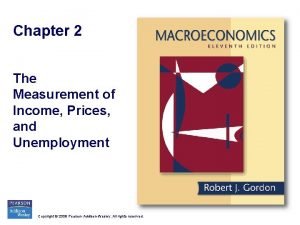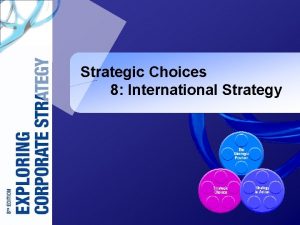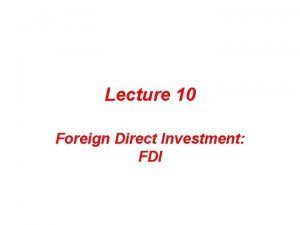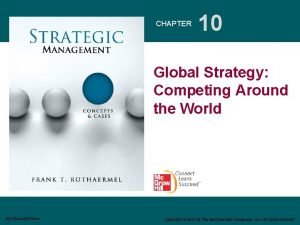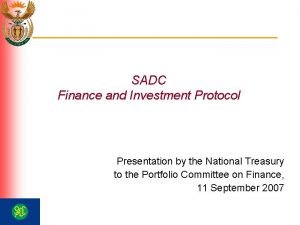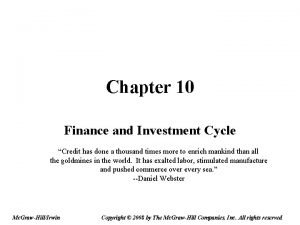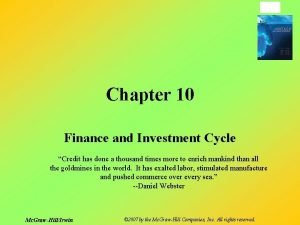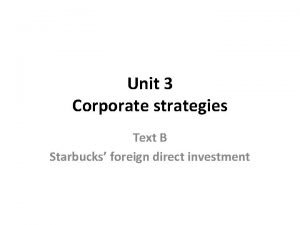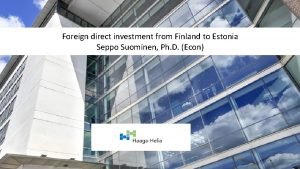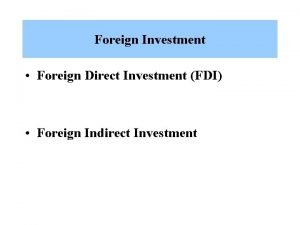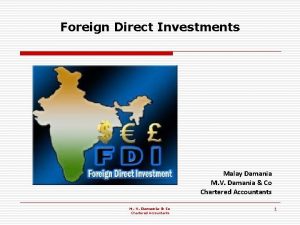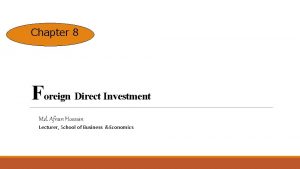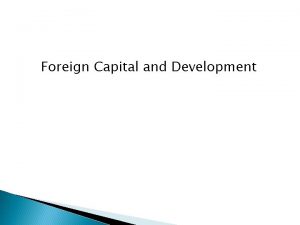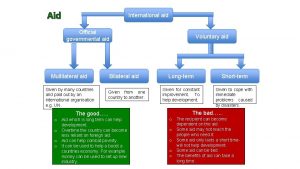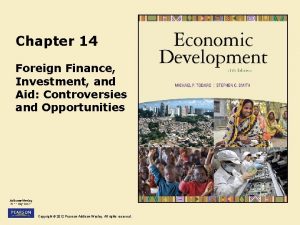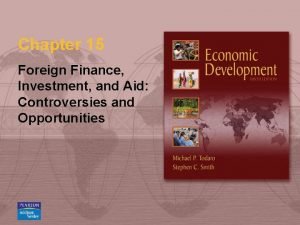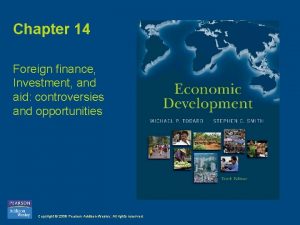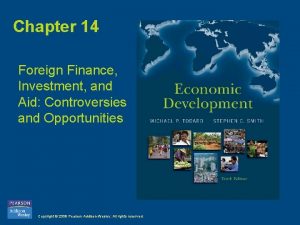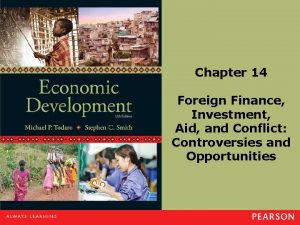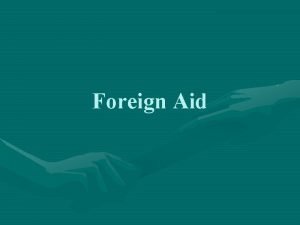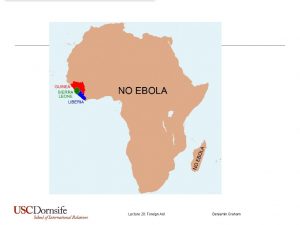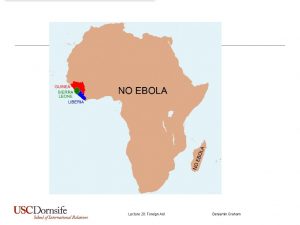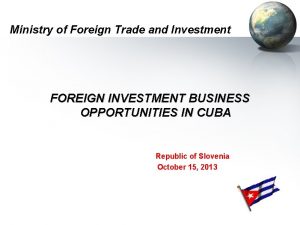Unit 7 Foreign finance investment and aid Foreign














- Slides: 14

Unit 7: Foreign finance, investment and aid:

Foreign finance, investment and aid • • • The international flow of financial resources Private foreign direct investment and MNC’s Private portfolio investment Foreign aid – development assistance The effect of conflict on development and finance Source: www. ventureafrika. com/why-africa/

Examine the international flow of capital Summary of content Foreign direct investment (FDI): done by large MNOs with headquarters in developed country, implies control of local company Foreign portfolio investment: done by private institutions and individuals in stocks, bonds and notes, speculation or profit purposes Foreign aid: done by governments, donor agencies or NGOs as development assistance http: //www. economist. com/news/finance-and-economics/21594476 -scarce

Private foreign direct investment FDI flows need to be understood in context: FDI inflows has become the largest source of foreign funds flowing to the developing countries. Sustainable economic growth is highly determined by the rate of investment which in turn is mainly determined by the national savings level. The national savings level of countries in Africa is quite low. Foreign direct investment (FDI) is an alternative source of capital to bridge the gap between savings and the required investment level. http: //www. economics. rutgers. edu

Foreign direct investment Arguments for and against FDI can fill the gaps between: targeted investment and locally mobilised saving targeted foreign-exchange requirements and net export earnings plus foreign aid targeted and locally raised government tax revenue required and available management/entrepreneurial/technology/skills Four counters to the gap-filling arguments: MNCs provide capital, but stifle domestic savings and investment rates Importation and repatriation activities by MNCs worsen the balance of payments Financial incentives significantly reduce MNCs contribution to public revenues MNCs dominance of local markets stifles indigenous entrepreneurship Other objections to FDI in developing countries: MNCs have an uneven impact on development MNCs produce inappropriate products with capital-intensive technologies which aggravates inequalities between rich and poor and urban and rural areas MNCs influence government policies in directions unfavourable to development MNCs may damage domestic industry and inhibit development of SMMEs MNCs may gain control over political decisions at all levels Interpretation of the debate: FDI can be an important stimulus for development as long as the interests of the host country and the MNC coincide

The rise of South African MNC has been noteworthy. In 1994, no South African firm was among the 50 largest Transnational Corporations from developing economies, ranked by foreign assets (UNCTAD, 1996). In 1997, there were three, and in 2001, there were five (UNCTAD, 1999; UNCTAD, 2003 b). www. na. sappi. com www. sasol. co. za www. barloword. com na. sappi. com How does South Africa’s MNC’s influence economic development? www. mtn. co. za

Example: Nestlé launches CREMORA manufacturing factory in Potchefstroom Nestlé ZAR launched its new CREMORA manufacturing factory on 2 February 2012 at Potchefstroom. The launch follows Nestlé South Africa’s recent R 106 million acquisition and upgrade of Potchefstroom based Specialised Protein Products (SPP), which also included the absorption of up to 120 employees. This acquisition is expected to increase the production capacity of its coffee creamer and offers Nestlé an opportunity to develop good quality and affordable products. The investment is aligned to Nestlé’s ambition of being a good corporate citizen, a preferred employer while offering consumers quality, nutritious and affordable products. To ensure a safe and productive working environment for all Nestlé employees at the factory, the company has upgraded equipment and installed state of the art safety systems in line with Nestlé’s high safety standards. Nestlé has been in South Africa for close to 100 years. Currently, the company employs about 4000 employees and it has a Level 4 BEE score. Nestlé Potchefstroom is the company’s 10 th manufacturing facility in South Africa and it is supported by three distribution centres. It is also in line with our long-term commitment to business sustainability and economic development in South Africa and the rest of the African continent, ”

Foreign portfolio investment Summary of content From recipient LDC perspective: A vehicle to raise capital for local firms: help domestic investors diversify their assets can improve efficiency of the whole financial sector as funds are allocated to firms with highest potential returns From policy/government perspective: Large and volatile flows can destabilize both the financial market and the economy It should not be used to camouflage basic structural weaknesses in the economy – the funds can be withdrawn immediately with devastating effects Foreign portfolio investment (FPI), on the other hand is a category of investment instruments that is more easily traded, may be less permanent, and do not represent a controlling stake in an enterprise. These include investments via equity instruments (stocks) or debt (bonds) of a foreign enterprise which does not necessarily represent a long-term interest. Stocks: • dividend payments • holder owns a part of a company • possible voting rights • open-ended holding period Bonds: • interest payments • ownership of bond rights only • no voting rights • specific holding period

Foreign aid: the development assistance debate Differentiate between: • • • Official development assistance Foreign aid Humanitarian aid http: //humanitarianaid. weebly. com/pros. html According to the World Bank USD 93 billion a year is needed for Sub-Saharan Africa’s infrastructure - two-thirds for investment in new physical infrastructure and a third for operations and maintenance of existing assets. However, only USD 45 billion is being mobilised. http: //www. oecd. org/ http: //www. dailymail. co. uk http: //www. usaid. gov/

Why donors give aid Todaro & Smith (2014: 747 -757) Summary of content Two criteria to define flow of capital as aid Non-commercial objective with the donor Must have concessional terms Why donors give aid: • • • Political motivations: Most NB, contain communism, geographically strategic Economic motivations: To fill the foreign exchange gap and the savings gap Economic self-interest: benefits to donors due to the aid given, tied aid – ‘buy our exports’ Why LDC’s accept aid: supplement scarce resources, political leverage, obligation due to past Role of NGO’s Voluntary organizations working with local grassroots organisations in LDCs Represent specific interest groups with diverse interest groups Two advantages: Less constrained by political imperatives – more effective No suspicion by local people about their motives

Conflict and development War is a development issue. War kills, and its consequences extend far beyond deaths in battle. Armed conflict often leads to forced migration, long-term refugee problems, and the destruction of infrastructure. Social, political, and economic institutions can be permanently damaged. The consequences of war, especially civil war, for development are profound. Credit: Uppsala Conflict Data Program/www. ucdp. uu. se/ged/

South Sudan peace talks collapse, election called off The overarching principle behind the crisis is poor governance ! The government should note that political legitimacy is something that is conferred by the people of a country when there is faith that the government's actions are an appropriate use of power, by a legally constituted governmental authority, and following correct decisions on making policies – Institute for security studies http: //www. issafrica. org/iss-today/south-sudan-peace-talks-collapse-election-called-off


 Fixed investment and inventory investment
Fixed investment and inventory investment Foreign direct investment advantages and disadvantages
Foreign direct investment advantages and disadvantages Foreign direct investment advantages and disadvantages
Foreign direct investment advantages and disadvantages Foreign direct investment advantages and disadvantages
Foreign direct investment advantages and disadvantages Sadc protocol on finance and investment
Sadc protocol on finance and investment Financing and investing cycle
Financing and investing cycle Investing cycle in auditing
Investing cycle in auditing Starbucks foreign direct investment case study
Starbucks foreign direct investment case study Foreign investment in finland
Foreign investment in finland Foreign indirect investment
Foreign indirect investment Malay damania
Malay damania Chapter 8 foreign direct investment
Chapter 8 foreign direct investment So here you are too foreign for home
So here you are too foreign for home Investment banking activities
Investment banking activities Types of foreign aid
Types of foreign aid
